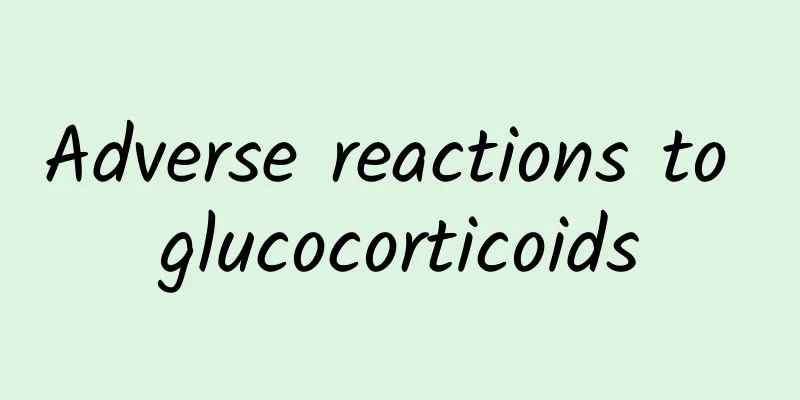Adverse reactions to glucocorticoids

|
Glucocorticoids are hormones used clinically to treat a variety of diseases. They have been widely used in many diseases, especially in many antihypertensive and hypoglycemic drugs. It can be said that glucocorticoids themselves are a good medicine that can assist in the treatment of a variety of diseases. However, we also know that all medicines are toxic, and glucocorticoids also have their own unique side effects. For example, some people may develop cardiovascular infections, mental disorders or other complications when taking glucocorticoids. So what are the adverse reactions of glucocorticoids? (1) Adrenocortical hyperfunction syndrome is caused by disorders of substance metabolism and water-salt metabolism, such as moon face, buffalo hump, centripetal obesity, thinning skin, acne, hirsutism, edema, hypokalemia, hypertension, diabetes, etc. The symptoms may disappear on their own after stopping the medication. Symptomatic treatment can be adopted if necessary, such as antihypertensive drugs, hypoglycemic drugs, potassium chloride, low-salt, low-sugar, high-protein diet, etc. Also: negative nitrogen balance, osteoporosis, increased appetite, hypokalemia, tendency to hyperglycemia, peptic ulcer (2) Inducing or aggravating infection is caused by the suppression of the body's defense function by corticosteroids. Long-term use may often induce infection or spread potential lesions in the body, especially in patients with existing diseases that have reduced resistance, such as nephrotic syndrome. It can also cause previously dormant tuberculosis lesions to spread and worsen. Therefore, tuberculosis patients should take anti-tuberculosis drugs when necessary. (3) Digestive system complications increase the secretion of gastric acid and pepsin, inhibit gastric mucus secretion, and reduce the resistance of the gastrointestinal mucosa. Therefore, they can induce or aggravate gastric and duodenal ulcers, and even cause gastrointestinal bleeding or perforation. In a small number of patients, it may induce pancreatitis or fatty liver. (4) Complications of the cardiovascular system: Long-term use can cause hypertension and atherosclerosis. (5) Osteoporosis, muscle atrophy, slow wound healing, etc. are related to hormones promoting protein decomposition, inhibiting its synthesis, and increasing calcium and phosphorus excretion. Osteoporosis is more common in children, the elderly and postmenopausal women, and in severe cases spontaneous fractures may occur. It can also affect growth and development by inhibiting the secretion of auxin and causing a negative nitrogen balance. It may occasionally cause teratogenesis in pregnant women. (6) Other mental disorders. Patients with a history of mental illness or epilepsy are prohibited from using or should use with caution. 2. Withdrawal reaction (1) For patients who have been using the drug for a long time, especially those who have been taking the drug for several days, if the dosage is reduced too quickly or the drug is stopped suddenly, the feedback effect of corticosteroids on the secretion of ACTH by the anterior pituitary gland may cause adrenal cortex atrophy and dysfunction. Most patients may have no symptoms. The time it takes for adrenal cortex function to recover is related to dosage, duration of medication and individual differences. After stopping hormone use, it takes 3 to 5 months for the pituitary gland to recover its ability to secrete ACTH; it takes about 6 to 9 months or longer for the adrenal cortex to recover its ability to respond to ACTH. Therefore, do not stop the medication abruptly. After stopping the medication, a small number of patients may experience adrenal crisis when encountering severe stress situations such as infection, trauma, and surgery, such as nausea, vomiting, fatigue, hypotension, shock, etc., which require timely rescue. This kind of cortical dysfunction may take half a year or even 1 to 2 years to recover. (2) Rebound phenomenon is caused by the patient's dependence on hormones or the condition has not been fully controlled. Sudden discontinuation of medication or rapid reduction in dosage may lead to recurrence or worsening of the original disease. It is often necessary to increase the dosage for further treatment, and then gradually reduce the dosage or stop the medication after the symptoms are relieved. These may all be adverse reactions to glucocorticoids, so if you are told to take this medicine in your daily life, you must pay attention to whether there are side effects. If there are side effects, you can replace it with other medicines or find other treatments. |
<<: The efficacy and function of Commelina
>>: The efficacy and function of radish seeds
Recommend
World Environment Day丨You may not have seen such a beautiful China
Today (June 5) is World Environment Day. In recen...
【Smart Farmers】Ancient and magical single cells - protozoa in aquaculture environments
Take a drop of water from the breeding pond, it l...
The efficacy and function of Southern Yunnan Senecio
Senecio yunnanensis is a famous traditional Chine...
Land→Ocean: How powerful are these hard-core “magic tools” that aid oil and gas exploration?
As early as the 11th century Shen Kuo, a scientis...
Chinese herbal medicine for removing freckles
Pigmentation is a disease that will have a certai...
The efficacy and function of fir fruit
Do you know about fir fruit? It is a common medic...
The Venus life incident almost brought this emerging research field into a dead end!
Scientists who are tirelessly searching for extra...
Taboos of morning glory
The Chinese medicinal herb morning glory seed, al...
The role and efficacy of Angelica dahurica
Angelica dahurica mainly has the effect of dispel...
What are the effects and functions of mixing Panax notoginseng and American ginseng?
The combination of Panax notoginseng and American...
JD Logistics Financial Report: JD Logistics Revenue in 2022 is 137.4 billion, a year-on-year increase of 31.2%
Recently, JD Logistics released its 2022 annual p...
The world is watching! What exactly is the "Starship" that Musk is going to launch today?
After four years of various tests, ignitions, and...
Weird, why are the fruits and vegetables in my refrigerator "sweating"?
In daily life, we are always used to putting fres...
Is it good to soak wolfberry in water to nourish the kidneys?
Wolfberry is a common nourishing food in our live...
The efficacy and function of red flower trichosanthes
The efficacy and function of the Chinese medicine...









